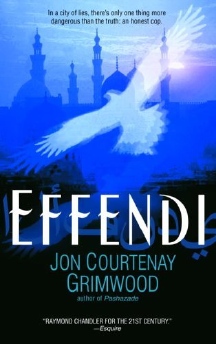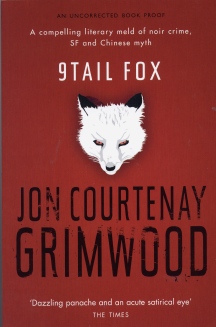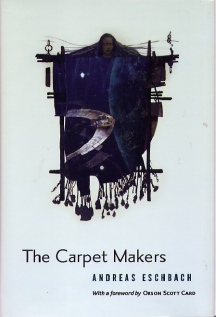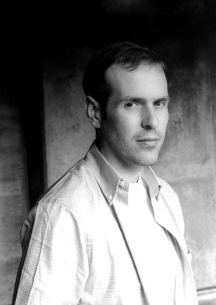|
|
|
This Just In...News from the Agony Column
|
06-17-05: Jon Courtenay Grimwood's '9 Tail Fox' and 'Effendi' |
||||||
Stalingrad
1942, San Francisco 2kx, and El Iskandria
On this side of the world, October sees the release of the trade paperback version of 'Effendi' (Bantam Spectra / Random House ; October, 2005 ; $12.00). This is the second in the 'Arabesque' series, following on from the opening entry 'Pashazade'. The 'Arabesque' novels -- 'Pashazade', 'Effendi' and 'Felaheen' are one of the most unique series you'll ever have the opportunity to read. They're densely imaginative, wildly atmospheric and yet they're filled with wonderful moments of characters you totally care about experiencing the warmth and joys of friendship. All this in a series of detective novels, albeit detective novels that are set in an alternate Middle East and featuring a hard-boiled man who has been modified with technology he doesn't quite understand. The twist that makes Grimwood's work so special is that he integrates the mean streets of Chandler, the luxurious Middle East of Durrell, and the wired world Gibson into an utterly seamless whole. Then he gives you sweet, sassy twelve-year old girl-genius to provide a wealth of warmth that is so perfect and unexpected, it lifts the novels to a level readers can't possibly expect. Sweet, hard-boiled and impossibly weird. All this before breakfast. And were it not for the fine folks over at Bantam Spectra, the USAians among us might have had to follow my fiscally unwise but oh-so-worldly example and import the damn things as they came out in hardcover. Now you can get them in your local independent bookstore for a song. Run, dont walk and pick up these books. Even if you already have the UK editions, these US editions will make fine loaning copies.
Sergeant Bobby Zha is the perfect denizen of San Francisco, California, AD 2kx. He Cantonese, Spanish and English, and is a none-of-the-above kind of guy no matter where he roams. Early on in '9 Tail Fox', he's murdered. This is a problem, even for someone who believes in the three worlds; the world of the demons, the world of the gods and our world. He sets out to solve his own murder. But the mystery is how the events in Stalingrad of 1942 play into Bobby's predicament in the present. Oh, you know they do, and finding out how is all fun. With 9 Tail Fox', Grimwood looks to be taking a step back from his usual SFnal pre-occupations, but with Grimwood looks can be deceiving. He's an absolute first-rate pro at starting a novel in the here-and-now and ending up in some peculiar but rigorously imagined surreal landscape that may derive as much from the mind of the character as it does from the dirt on his shoes. This time around, the journey includes a trip through Chinese folklore. You can bet it will be intense and well-imagined. And you can hope it will show up on USAian shores. My take is that readers should be queuing up now. I'd love to see the Arabesques dotting the paperback best-seller lists. Of course that might happen out of time, out of place, in cities and worlds that exist only in his minds. |
|
06-16-05: Andreas Eschbach 'The Carpet Makers' |
|||
Importing
the Finest Vintages -- Through A Filter
Dorna Khazeni's work translating Michel Houellebecq is another example of perfect pitch. I enjoyed her translation of 'H. P. Lovecraft: Against the World, Against Life' so much, I read it aloud on public radio. Linda Coverdale did a lovely job on Emmanuel Carrere's 'The Adversary'. The point is that there's lots of great literature out there that those of us stuck in the English language are of necessity missing. Statistics would suggest that there are more great books in other languages than English. We just dont get to see that many of them. The problem is, of course, in the translation. It's one thing to ship a bottle of wine over from France. It's quite another to get a book translated from the French. The risks in importing translated fiction make it analogous to importing wine through a filter. It's incredibly risky at best. That's why 'The Carpet Makers' (Tor Books / Tom Doherty Associates; April 29, 2005 ; $24.95) by Andreas Eschbach is such an exciting event. First published in the Germany in 1995, and given acclaim and awards, it's precisely the kind of science fiction novel that we hope to hear about in the US. But it took the powerhouse convictions of Orson Scott Card, who was given a short story by Eschbach while at a convention in France, to get the novel translated and published in America. We all know that Card is a bestselling writer whose keystone novel, 'Ender's Game' has been in development as a film for years and now seems to be coming to some sort of fruition. That's the kind of heft it takes to get a translated novel done. That and a great translator. While at the convention, Card was surrounded by Frenchmen who could talk about nothing but Eschbach, whom they considered not just the best new science fiction writer, but the best new writer, period. But Card didn't read German, so he asked a friend, Doryl Jensen, who spoke German fluently and was also a writer and poet, to translate the short story he'd been given. Card was blown away by the story, as was Jensen. Imagine Card's surprise when he found out that the short story was just the beginning of Eschbach's novel. Card used up some of his "political capital" so to speak, and managed to get Tor to hire Jensen to translate the novel. And that's why you have the opportunity to buy 'The Carpet Makers' in English. I've read the opening short story, and it's a gorgeous, dark tale that I wouldnt have guessed had been translated had I not been told. Jensen and Eschbach create seamless, slick prose that wraps itself around a very unusual story. It has the simple power of myth or fairy tale. Ostvan is an old man who has spent his entire life creating a carpet from the cut hair of his wives. Each man in his family has done this for unknown generations. But Ostvan's son, Abron, is not interested in carpet making. He's interested in reading, in traveling, in things beyond the house. The carpets, when complete, are sold to the Emperor of an interstellar empire. The profits gained from the sale of a completed carpet will support the scion of the following generation as he creates the next carpet. It's a system that has never changed in any of the years of the empire. But Abron tells Ostvan that there is news that the Emperor has died. Perhaps change has arrived. And one wonders how a carpet can be worth a lifetime. Gorgeous prose, a unique premise and the transparent, timeless feel of a fable; this is what you have to look forward to in 'The Carpet Makers'. Oh, and two more novels already finished -- one already filmed -- in waiting. No, it's not always possible to import the finest vintages. But when you can, the world itself opens up to you. |
|
06-15-05: Jackpot by Tsipi Keller |
|||
Moral
Degradation as Horror Fiction
Tsipi Keller was born in Prague, raised in Israel and has lived in New York since 1974. Her new novel 'Jackpot' (Spuyten Duyvil ; November , 2004; $13.00 TPB) is a very feminine take on the venerable theme of a character who takes a dive. She does this by getting right inside the head of a typically insecure young woman and sending her to a tropical paradise. Of course, this is a paradise that operates at a profit. Maggie is our heroine, and her tale is told in a tightly focused third-person present tense, an unusual choice that makes for a pretty compelling read. What Keller does quite well is to convey the mix-and-match set of self-doubts and small fears that drive this young woman to seek the company of Robin, who is richer, prettier and more secure. Robin manages to convince Maggie to join her at Paradise Island and it's all downhill from there. The problem with novels of degradation is that the depressing nature of the narrative slows down the reading. If you like the character, then you'll not like seeing the character take a trip down the big swirly. Keller gets the reader past this with her present-tense prose and the wealth of understated humor inherent in her perspective on her character. Now this is not a novel of the supernatural. No devils or vampires are to be found in here, beyond the kind of devils and vampires you find every day. And the degradation is not going to approach what you'll find in the non-fiction work of Chuck Palahniuk. But what you will find is a very fully-realized insecure woman's nightmare, with the looming threat of embarrassment, revenge and job loss hovering at the edges of the character's psyche. This is a novel that deals in the repellent nature of moral weakness. It didn't strike me as preachy, however. It's more creepy than cautionary, as Maggie slowly succumbs to the lure of Paradise Island. 'Jackpot' is low-key but effective horror on offer for our readers. The publisher of Keller's novel, Spuyten Duyvil is not exactly a household word, but they have a huge line of original fiction available in these attractive trade paperback editions. Readers who are interested in some offbeat, low-key slightly odd fiction will want to take a gander at their website. Of course, you might have a, "Be still, my empty wallet" moment, but you might have those quite often if you read this column. The print quality is pristine, as fine as anything you're going to find from the major publishers, who themselves should be scared. Or perhaps ashamed. |
|
06-14-05: Talking Sherlock Holmes |
||||||
A
Conversation With Mitch Cullin and Laurie R. King
Both these writers were a joy to speak to, and they conversed quite well with one another, which was of course part of my plan. Anything to make the interview more entertaining. We talked about their early experiences with Sherlock Holmes, the gravity of Holmes' character, and the importance of the many adaptations of Holmes. For those of my readers who consider themselves Sherlockians, this will be a real treat, and for everyone else a most entertaining education. Laurie was quick to point out something I had noticed as well -- that cultural zeitgeist being what it is, both Mitch Cullin and Michael Chabon have novels with an aged Sherlock Holmes confronting what she called "The ultimate mystery" -- that is, their own death. And I'd have to say that readers who enjoyed Michael Chabon's 'The Final Solution' should run as fast as they can to pick up Cullin's novel. The two novels are of equal quality and rather different. Cullin has the kind of fine style that will make you want to read his other work as well. He's the author of 'Tideland', which is being adapted into a film by Terry Gilliam. I asked Mitch about this, and he told me, among other things, that the final product will be something like "Terence Malick on acid". That's the kind of description that gets me into the bookstore to read the book -- and then into the theater to see the movie.
Laurie's novel 'Locked Rooms' is out next week, and she'll be at Capitola Book Café on June 25 to talk about it. Readers who want to see the guest star of the book and join Laurie R. King at the launch party can do so on June 22, at the Ferry Building in San Francisco at 6:00 PM. In keeping with the subject of the book, there will "Al Jolson, Sophie Tucker, The Charleston, glasses of bubbly" -- everything required to get you in the mood for the reading at Book Passage at 7:00 PM. Check out her website for more information. Readers can download the MP3 or RealAudio versions of the interview with Laurie R. King and Mitch Cullin now, and gear themselves up for summer nights of Sherlock Holmes. These are both outstanding books, finely written and wonderfully entertaining. No dance lessons required! |
|
06-13-05: 'Freddy and Fredericka' by Mark Helprin |
|||
Farce with a Literary Pedigree
So I find myself doubly shocked by the forthcoming novel 'Freddy and Fredericka' (Penguin Press / Penguin Putnam ; July 11, 2005 ; $27.95). I certainly didn't expect another work from this famous writer so soon, and certainly not another one of his 550 page novels. But that surprise pales beside that at the content of 'Freddy and Fredericka'. Yes, we expect the details we get in this book, the sweeping sense of an epic. What we dont expect from Mark Helprin is an epic farce. And yet here it is, a droll, funny novel by the author of 'Winter's Tale' in which Freddy, the feckless Prince of Wales and Fredericka, his troublesome wife, are sent to "colonize America" in order to rid the Royals of their embarrassing presence. What unfolds is surreal, odd, and filled with the kind of rich details that make Helprin's work so affecting. But there's also something else at work here, an anarchic sense of humor that benefits from Helprin's ability to spin out a tale that seems grounded by detail in a world that is like ours, a world that is very real, but a world that is undeniably not ours. Unless a set of Royals we dont know about managed to parachute into New Jersey when we weren't looking. From there Freddy and Fredericka spin off into a very weird road tour of America, Mark Helprin-style. And it's here that his skills as a surrealist serve him so well comedically. His ability to convincingly conjure the absurd enables him to set up his jokes with the proper amount of seriousness. To me, this is critical. The best comedians take their material totally seriously and approach it with total sobriety. Few writers are able to bring this to the table as well as Mark Helprin. This becomes totally apparent in the Prologue, "written" by Geoffrey Lord Piggleswade. Helprin nails the lovely cadences of formal British address and finesse and within that form unfurls his penchant for the absurd. Yes, this is a major departure for this writer who heretofore has been known for his ability to evoke the lovely, the horrific and the ineffable. But it's a job he's particularly well suited for. To add to the appeal of this novel, Helprin is coming on tour this year. He's stopping at fourteen cities in July, including the Capitola Book Café on July 27, and you should take a gander and see if he's showing up at an independent bookstore near you. Youre not likely to have many chances in your life to hear this man read. Ten years may go by before you see another book from him. Dont find yourself wondering where the time went -- spend your time immersed in Mark Helprin's latest, and then hear him read it. Wait ten years and wonder where theyve gone. |






